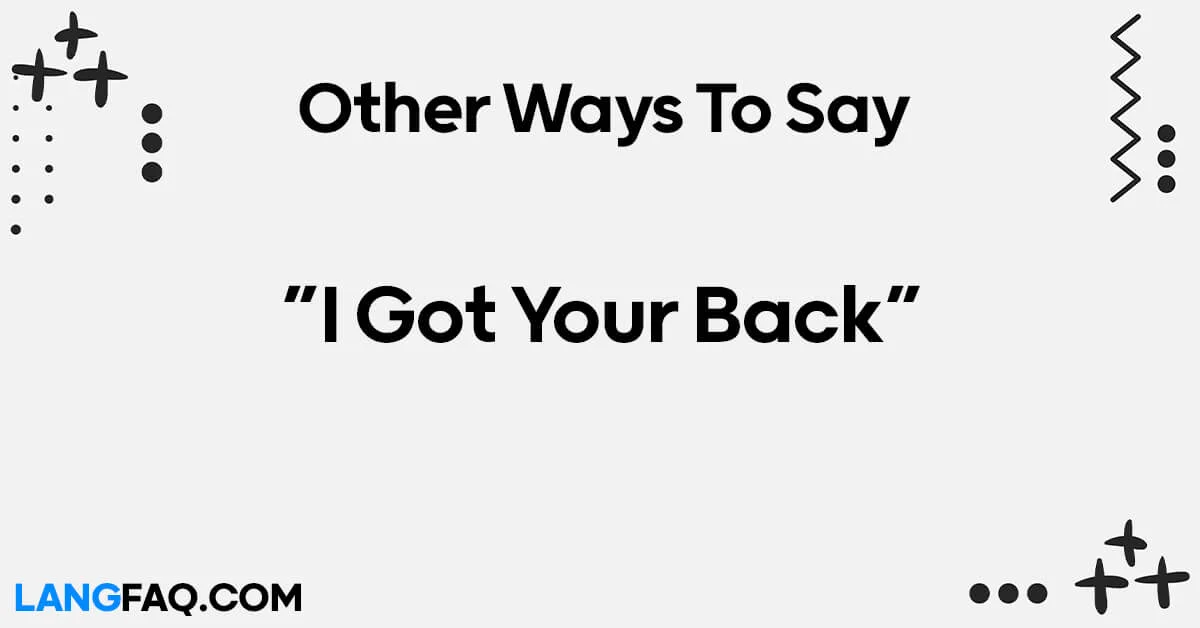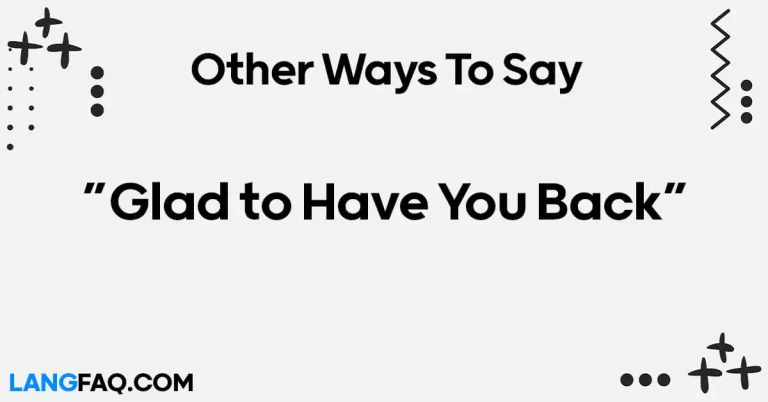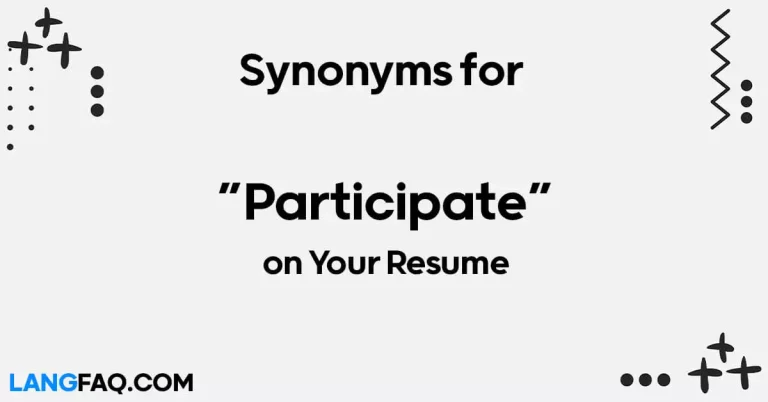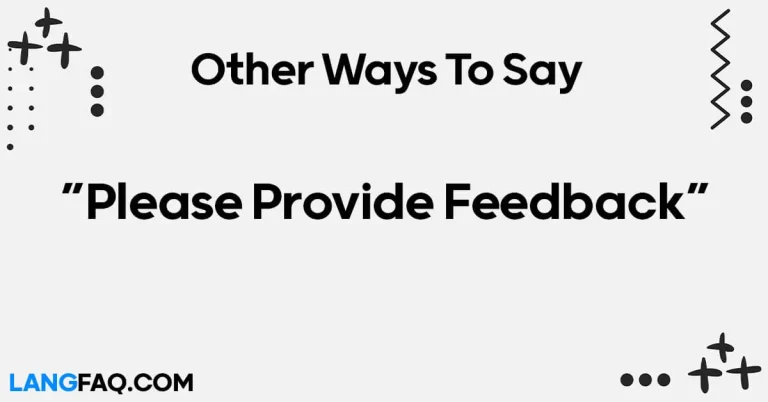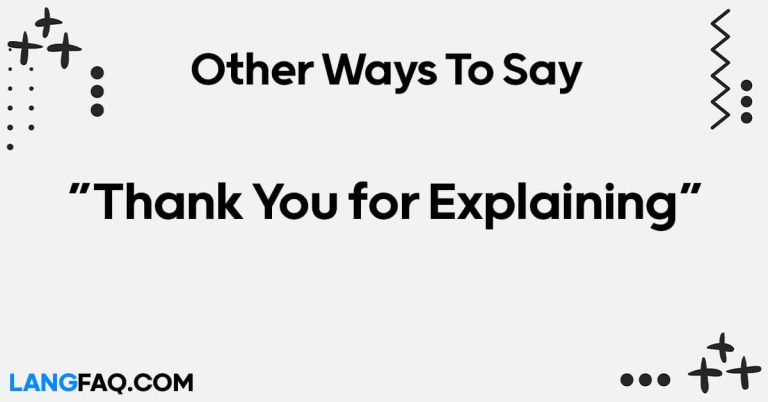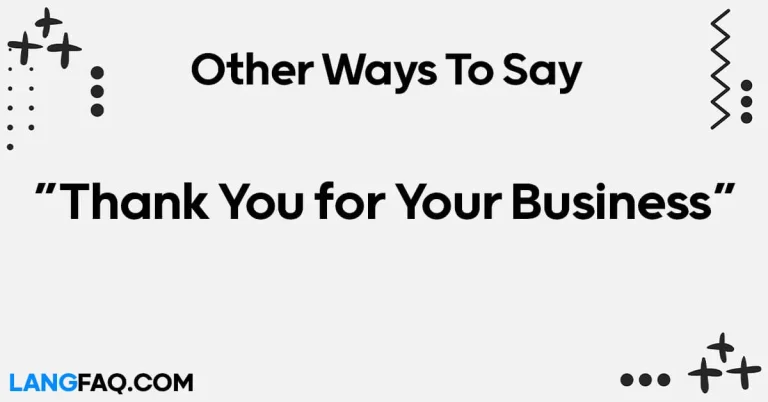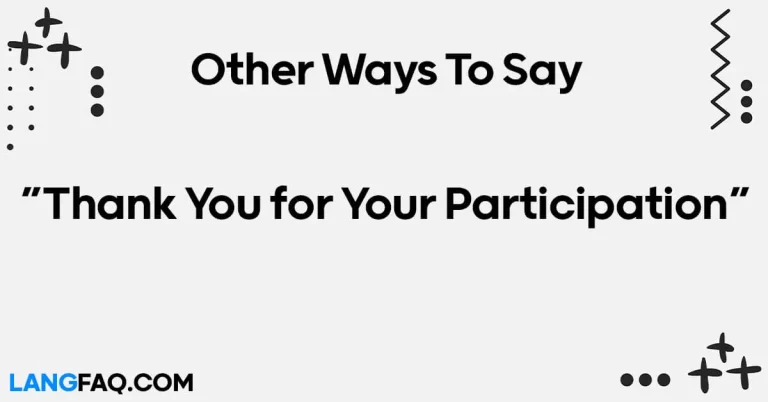In the intricate tapestry of relationships, the phrase “I Got Your Back” holds a special place, signifying unwavering support and solidarity. However, language is rich, and there are myriad ways to express this sentiment. This article unfolds 12 unique ways to articulate support, fostering stronger connections and reinforcing the bonds that make relationships resilient.
12 Other Ways to Say “I Got Your Back”
Here are 12 other ways to say “I Got Your Back”:
- I’m here for you.
- You can count on me.
- I’ve got you covered.
- I’ll support you all the way.
- You’re not alone; I’m with you.
- I’ll stand by you.
- Lean on me; I’m here to help.
- You’ve got my support.
- I’ll be your ally.
- You can rely on me.
- I’ll back you up.
- I’m in your corner.
| Expression | Meaning | Example |
|---|---|---|
| I’m here for you. | Offering support and availability. | “If you ever need someone to talk to, I’m here for you.” |
| You can count on me. | Assuring reliability and trust. | “No matter what, you can count on me to help you through.” |
| I’ve got you covered. | Providing complete support or protection. | “Don’t worry; I’ve got you covered for the presentation.” |
| I’ll support you all the way. | Committing to support throughout the journey. | “I believe in your goals, and I’ll support you all the way.” |
| You’re not alone; I’m with you. | Expressing companionship and solidarity. | “In tough times, remember you’re not alone; I’m with you.” |
| I’ll stand by you. | Promising unwavering support. | “Through thick and thin, I’ll stand by you.” |
| Lean on me; I’m here to help. | Offering a supportive presence. | “Feel free to lean on me; I’m here to help you.” |
| You’ve got my support. | Confirming commitment to support. | “Whatever you decide, you’ve got my support.” |
| I’ll be your ally. | Positioning oneself as a supportive ally. | “Consider me your ally in this endeavor.” |
| You can rely on me. | Ensuring dependability and trust. | “In times of need, you can rely on me to be there.” |
| I’ll back you up. | Offering support and assistance. | “Don’t worry; I’ll back you up in the negotiation.” |
| I’m in your corner. | Conveying support and advocacy. | “No matter what, I’m in your corner, supporting your decisions.” |
These expressions go beyond the literal sense of having someone’s back, conveying a deep commitment to providing support, trust, and companionship. Whether it’s facing challenges or celebrating victories, these phrases assure others that they are not alone, creating a foundation for strong and enduring connections.
Is It Correct to Say “I Got Your Back”?
Yes, the phrase “I Got Your Back” is a colloquial and informal way of expressing support, assurance, and loyalty. It is a common idiomatic expression used in both casual and professional contexts to convey the message that you are there to support someone, especially in challenging or difficult situations.
Usage in Informal Contexts: Among friends or in casual conversations, saying “I Got Your Back” signifies a strong sense of camaraderie and support. For example, if a friend is going through a tough time, assuring them by saying, “Don’t worry, I got your back,” conveys a sense of loyalty and friendship.
Usage in Professional Contexts: In the workplace, while the phrase is less formal, it can still be used among colleagues who share a close and supportive working relationship. For instance, a team member might say to another before a challenging presentation, “You’ll do great; I got your back.”
Grammar Note: The phrase is a colloquial expression, and while it might not be suitable for formal writing or professional emails, it is perfectly acceptable in spoken language, informal writing, or settings where a relaxed tone is appropriate.
Variations:
- Formal Alternative: In more formal situations, you might use expressions like “I am here to support you” or “You can rely on me.”
- Casual Synonyms: Other informal alternatives include “I’m here for you,” “You can count on me,” or “I’ll support you.”
Professional Mail Example With “I Got Your Back”
Subject: Support During Project Crunch
Dear [Colleague’s Name],
I trust this email finds you well. As we approach the final stages of the upcoming project, I wanted to reach out and assure you that I got your back.
I understand the challenges and pressure that often come with tight deadlines and client expectations. Rest assured, you’re not navigating this alone. Whether it’s reviewing deliverables, providing additional resources, or offering support during presentations, I am here to back you up.
Feel free to reach out if there’s anything specific you need assistance with or if you’d like to discuss strategies for the final stretch. Together, we can ensure the success of this project.
Looking forward to a successful collaboration.
Best regards,
[Your Full Name] [Your Position] [Your Contact Information]
I’m Here for You: Offering Unwavering Support
In times of need, expressing the sentiment “I’m Here for You” is a powerful way to convey unwavering support. Whether you’re consoling a friend or comforting a colleague, this phrase provides a sense of reassurance and availability.
Usage in a Professional Context: Imagine a colleague going through a challenging project. Offer your support by saying, “I understand this project is demanding. Remember, I’m here for you, and we can work through it together.”
Usage in a Personal Context: If a friend is facing a difficult personal situation, reassure them by saying, “I heard about what you’re going through. I just want you to know, I’m here for you, no matter what.”
Variations:
- Colleague Support: “Facing a tight deadline? I’m here for you if you need any assistance.”
- Friendship: “Dealing with a breakup is tough. I’m here for you, my friend.”
- Mentor-Mentee: “Navigating your first project can be challenging. I’m here for you every step of the way.”
Grammar Tip: Ensure sincerity by using a calm and empathetic tone. This phrase works wonders when accompanied by a specific offer of assistance or a listening ear.
Example Email Snippet:
Subject: Support During Project Crunch
Hi [Colleague’s Name],
I hope this email finds you well. I heard about the challenges the project is throwing your way. Just wanted to remind you that I’m here for you. If you need any help or just want to talk through things, feel free to reach out.
Best, [Your Name]
You Can Count on Me: Assuring Reliability and Trust
The phrase “You Can Count on Me” exudes reliability and trust, assuring others that you’re dependable in both personal and professional settings. It’s a commitment to being a reliable ally.
Usage in a Professional Context: When working on a team project, reassure your colleagues by saying, “No matter the workload, you can count on me to deliver my part with excellence.”
Usage in a Personal Context: In a friendship, convey trust by saying, “I know this is challenging, but you can count on me to be there for you through it all.”
Variations:
- Colleague Assurance: “Meeting the client’s expectations is crucial. You can count on me to handle our part effectively.”
- Friendship Reassurance: “Life can be unpredictable, but you can count on me to be a constant in your journey.”
- Mentor-Mentee Commitment: “Embarking on a new project? You can count on me to guide you through the process.”
Grammar Tip: This phrase is most impactful when followed by a specific commitment or action, reinforcing the trust you aim to convey.
Example Email Snippet:
Subject: Reliability Amidst Challenges
Hi [Team Member’s Name],
As we navigate the upcoming project, I want to assure you that you can count on me. I’m committed to delivering my tasks effectively and supporting the team. Let’s ensure our success together.
Best, [Your Name]
I’ve Got You Covered: Providing Complete Support or Protection
When you tell someone “I’ve Got You Covered,” you’re essentially expressing a commitment to providing complete support or protection. This phrase is versatile and can be applied in various contexts, emphasizing your readiness to assist.
Usage in a Professional Context: Assure a coworker before a crucial meeting by saying, “Don’t worry about the presentation; I’ve got you covered. We’ve prepared thoroughly.”
Usage in a Personal Context: If a friend is going through a tough time, offer support by saying, “Facing a challenge? I’ve got you covered; we’ll get through this together.”
Variations:
- Colleague Support: “Presenting to the client can be nerve-wracking, but I’ve got you covered with all the necessary data.”
- Friendship: “Dealing with a family crisis is never easy, but I’ve got you covered. Lean on me.”
- Mentor-Mentee: “Beginning your first project might feel overwhelming, but don’t worry—I’ve got you covered with guidance.”
Grammar Tip: Use this phrase when you want to convey a sense of preparedness and assurance. It works well in situations where someone might be feeling vulnerable or uncertain.
Example Email Snippet:
Subject: Support for Tomorrow’s Presentation
Hi [Colleague’s Name],
I know tomorrow’s client presentation is crucial. Just wanted to let you know, I’ve got you covered. We’ve covered all aspects, and I’m confident it will go smoothly.
Best, [Your Name]
I’ll Support You All the Way: Committing to Support Throughout the Journey
“I’ll Support You All the Way” is a declaration of unwavering commitment, emphasizing your dedication to standing by someone’s side through all the ups and downs. It’s a promise to be a constant presence in their journey.
Usage in a Professional Context: Encourage a team member embarking on a challenging project by saying, “This project is ambitious, but don’t worry—I’ll support you all the way, ensuring success.”
Usage in a Personal Context: Express your commitment to a friend pursuing a dream by saying, “Starting a new venture? I’ll support you all the way, cheering you on from the sidelines.”
Variations:
- Colleague Encouragement: “Leading a new initiative is challenging, but I’ll support you all the way, providing guidance whenever needed.”
- Friendship Pledge: “Embarking on a fitness journey? Count me in; I’ll support you all the way, from workouts to healthy meals.”
- Mentor-Mentee Dedication: “Navigating your career can be tough, but remember, I’ll support you all the way, helping you grow.”
Grammar Tip: Use this phrase when you want to convey long-term commitment and emphasize your dedication to someone’s overall success.
Example Email Snippet:
Subject: Full Support for Your New Project
Hi [Team Member’s Name],
I heard about the new project you’re leading. I just wanted to reach out and say, I’ll support you all the way. Let’s ensure this project becomes a great success together.
Best, [Your Name]
You’re Not Alone; I’m with You: Expressing Companionship and Solidarity
In challenging times, telling someone “You’re Not Alone; I’m with You” provides a comforting reassurance of companionship and solidarity. This phrase is a reminder that together, difficulties can be faced and conquered.
Usage in a Professional Context: Support a colleague dealing with a challenging project by saying, “I know it’s tough, but you’re not alone; I’m with you every step of the way.”
Usage in a Personal Context: Comfort a friend facing personal struggles by saying, “Whatever you’re going through, remember you’re not alone; I’m with you, offering my support.”
Variations:
- Colleague Encouragement: “Managing a team transition can be isolating, but you’re not alone; I’m with you, providing support and guidance.”
- Friendship Assurance: “Dealing with a family crisis is never easy, but you’re not alone; I’m with you, offering a listening ear and a helping hand.”
- Mentor-Mentee Support: “Navigating the early stages of your career can be daunting, but you’re not alone; I’m with you, sharing insights and advice.”
Grammar Tip: Use this phrase when you want to convey empathy and assure someone that they have a companion in their journey.
Example Email Snippet:
Subject: Support During Challenging Times
Hi [Recipient’s Name],
I heard about the challenges you’re facing, and I want you to know you’re not alone; I’m with you. If you need someone to talk to or support in any way, I’m here.
Best, [Your Name]
I’ll Stand By You: Promising Unwavering Support
“I’ll Stand By You” is a steadfast declaration of unwavering support. This phrase conveys a commitment to standing beside someone through thick and thin, symbolizing loyalty and reliability.
Usage in a Professional Context: Assure a coworker dealing with workplace challenges by saying, “Facing office politics can be tough, but I’ll stand by you, ensuring a supportive work environment.”
Usage in a Personal Context: Support a friend going through a personal crisis by saying, “I know times are tough, but I’ll stand by you, offering my friendship and support.”
Variations:
- Colleague Reassurance: “Handling a client complaint can be stressful, but I’ll stand by you, providing assistance and addressing concerns together.”
- Friendship Pledge: “Navigating a difficult relationship is hard, but I’ll stand by you, offering a listening ear and advice.”
- Mentor-Mentee Commitment: “Embarking on a new project may be challenging, but I’ll stand by you, guiding you through each step.”
Grammar Tip: Use this phrase when you want to convey a sense of loyalty and a commitment to being a reliable support system.
Example Email Snippet:
Subject: Assurance of Support
Hi [Colleague’s Name],
I know the recent challenges have been demanding. Just wanted to remind you that I’ll stand by you, offering my support in overcoming these hurdles.
Best, [Your Name]
Lean on Me; I’m Here to Help: Offering a Supportive Presence
When you tell someone to “Lean on Me; I’m Here to Help,” you are extending an invitation for them to seek comfort and assistance. This phrase emphasizes your readiness to provide a supportive presence in times of need.
Usage in a Professional Context: Encourage a stressed colleague by saying, “If the workload becomes overwhelming, don’t hesitate to lean on me; I’m here to help navigate through it.”
Usage in a Personal Context: Support a friend going through a tough time by saying, “During challenging moments, feel free to lean on me; I’m here to help in any way I can.”
Variations:
- Colleague Encouragement: “Dealing with tight deadlines is stressful, but feel free to lean on me; I’m here to help with any tasks.”
- Friendship Reassurance: “I know this situation is difficult, but remember, you can always lean on me; I’m here to help you get through it.”
- Mentor-Mentee Support: “Embarking on a new project might be daunting, but don’t hesitate to lean on me; I’m here to help you succeed.”
Grammar Tip: This phrase conveys empathy and a willingness to actively assist. Use it when you want to offer practical help and emotional support.
Example Email Snippet:
Subject: Offering Support Amidst Challenges
Hi [Recipient’s Name],
I understand the challenges you’re facing, and I want you to know you can lean on me. If there’s anything specific you need help with or if you just want to talk, I’m here for you.
Best, [Your Name]
You’ve Got My Support: Confirming Commitment to Support
When you say “You’ve Got My Support,” you are expressing a clear commitment to standing behind someone, providing assurance that they can rely on you. This phrase is direct and impactful in both professional and personal contexts.
Usage in a Professional Context: Reassure a team member facing a challenging project by saying, “Handling client expectations can be intense, but remember, you’ve got my support throughout the process.”
Usage in a Personal Context: Support a friend pursuing a personal goal by saying, “Starting a new chapter is exciting, and you’ve got my support all the way. I believe in your success.”
Variations:
- Colleague Assurance: “Managing a team transition can be challenging, but rest assured, you’ve got my support. We’ll navigate this together.”
- Friendship Reassurance: “Dealing with a family crisis is never easy, but you’ve got my support. Lean on me during this tough time.”
- Mentor-Mentee Dedication: “Embarking on your career journey is significant, and you’ve got my support. I’m here to guide you.”
Grammar Tip: This phrase is straightforward and powerful. Use it when you want to assure someone of your unwavering commitment to support.
Example Email Snippet:
Subject: Assuring Support Throughout the Project
Hi [Team Member’s Name],
I know the upcoming project is demanding, but I want you to know you’ve got my support. Together, we’ll ensure its success.
Best, [Your Name]
I’ll Be Your Ally: Positioning Oneself as a Supportive Ally
“I’ll Be Your Ally” conveys a strong commitment to being a reliable supporter, especially in situations where one may face challenges or conflicts. This phrase emphasizes partnership and trust.
Usage in a Professional Context: Support a colleague dealing with workplace conflicts by saying, “In the upcoming meeting, remember I’ll be your ally. We’ll address the challenges together.”
Usage in a Personal Context: Assure a friend facing interpersonal issues by saying, “Navigating through misunderstandings is tough, but I’ll be your ally, offering support and understanding.”
Variations:
- Colleague Encouragement: “Handling a project disagreement can be stressful, but rest assured, I’ll be your ally, supporting your perspective.”
- Friendship Pledge: “Dealing with personal conflicts is never easy, but I’ll be your ally, helping you find resolutions.”
- Mentor-Mentee Support: “Embarking on a challenging project might feel overwhelming, but remember, I’ll be your ally, providing guidance.”
Grammar Tip: Use this phrase when you want to emphasize your commitment to supporting someone through challenges and conflicts.
Example Email Snippet:
Subject: Assurance of Support in the Meeting
Hi [Colleague’s Name],
I know the upcoming meeting might be challenging, but I want you to know I’ll be your ally. Let’s navigate through it together.
Best, [Your Name]
You Can Rely on Me: Ensuring Dependability and Trust
The phrase “You Can Rely on Me” is a straightforward expression of dependability and trust. It reassures others that you are a reliable source of support and assistance.
Usage in a Professional Context: Assure a team member managing a project by saying, “Meeting the project deadline is crucial, and you can rely on me to contribute effectively.”
Usage in a Personal Context: Support a friend going through a tough time by saying, “In difficult moments, you can rely on me. I’m here to lend an understanding ear.”
Variations:
- Colleague Assurance: “Dealing with a client’s concerns is challenging, but you can rely on me to address and resolve the issues.”
- Friendship Reassurance: “Facing personal struggles is hard, but remember, you can rely on me for support and companionship.”
- Mentor-Mentee Commitment: “Embarking on your career journey is significant, and you can rely on me for guidance and mentorship.”
Grammar Tip: Use this phrase when you want to emphasize your reliability and willingness to provide consistent support.
Example Email Snippet:
Subject: Assuring Support and Reliability
Hi [Recipient’s Name],
I understand the challenges you’re facing, and I want you to know you can rely on me. If there’s anything specific you need help with, I’m here for you.
Best, [Your Name]
I’ll Back You Up: Offering Support and Assistance
“I’ll Back You Up” is a dynamic expression of support, signifying your commitment to actively assist and provide the necessary backing in various situations.
Usage in a Professional Context: Support a colleague making a difficult decision by saying, “Whatever decision you make, I’ll back you up. We’ll face the consequences together.”
Usage in a Personal Context: Assure a friend taking a bold step by saying, “Starting a new venture is brave, and I’ll back you up every step of the way. Your success is mine too.”
Variations:
- Colleague Encouragement: “Presenting to the management can be intimidating, but rest assured, I’ll back you up, highlighting the team’s achievements.”
- Friendship Reassurance: “Dealing with a challenging situation is daunting, but remember, I’ll back you up, offering my support and guidance.”
- Mentor-Mentee Support: “Embarking on a new project may be overwhelming, but don’t worry—I’ll back you up, providing insights and assistance.”
Grammar Tip: This phrase conveys active support and collaboration. Use it when you want to emphasize your readiness to assist in various situations.
Example Email Snippet:
Subject: Assuring Support in Decision-Making
Hi [Colleague’s Name],
I understand the decision-making process can be challenging. I want you to know that whatever decision you make, I’ll back you up. Let’s navigate this together.
Best, [Your Name]
I’m in Your Corner: Conveying Support and Advocacy
“I’m in Your Corner” is a metaphorical expression that vividly conveys support and advocacy. It implies standing by someone’s side, ready to champion their cause.
Usage in a Professional Context: Reassure a team member facing criticism by saying, “Criticism can be tough, but I want you to know I’m in your corner, supporting your ideas and contributions.”
Usage in a Personal Context: Support a friend facing a personal challenge by saying, “I know this is hard, but remember, I’m in your corner, cheering you on and offering my support.”
Variations:
- Colleague Encouragement: “Pitching a new concept can be nerve-wracking, but don’t worry—I’m in your corner, advocating for your innovative ideas.”
- Friendship Reassurance: “Dealing with personal setbacks is never easy, but you’re not alone—I’m in your corner, offering my unwavering support.”
- Mentor-Mentee Dedication: “Embarking on a new project might feel overwhelming, but rest assured, I’m in your corner, providing guidance and assistance.”
Grammar Tip: Use this phrase when you want to convey advocacy and a commitment to actively support someone’s cause.
Example Email Snippet:
Subject: Advocating for Your Ideas
Hi [Recipient’s Name],
I understand the challenges you’re facing with the new proposal. Just wanted to remind you that I’m in your corner. Let’s continue advocating for your innovative ideas.
Best, [Your Name]
FAQs
Q: How can I express support in a more casual manner?
A: Opt for a playful tone with expressions like “Partner in Crime” or “In Your Corner” for a light-hearted touch.
Q: What phrase emphasizes long-term commitment?
A: “Lifelong Supporter” beautifully conveys enduring commitment and lasting support.
Q: Which expression focuses on facing challenges together?
A: “United Front” vividly illustrates the strength derived from unity when confronting challenges.
Q: How can I assure someone of my unwavering support?
A: Choose “Solid as a Rock” to convey unwavering strength and reliability.
Q: Which phrase signifies shared experiences?
A: “Walking the Path Together” beautifully captures the essence of shared experiences and mutual support.
Q: Can support be expressed with a touch of humor?
A: Certainly! Use “Partner in Crime” for a playful and light-hearted way to convey support.
Conclusion:
Language is a powerful tool for expressing emotions and reinforcing connections. Exploring various ways to say “I Got Your Back” not only adds richness to our expressions but also strengthens the fabric of relationships. Choose the phrase that resonates with you, and let your loved ones know that, in whatever form, your support is steadfast and unwavering.

